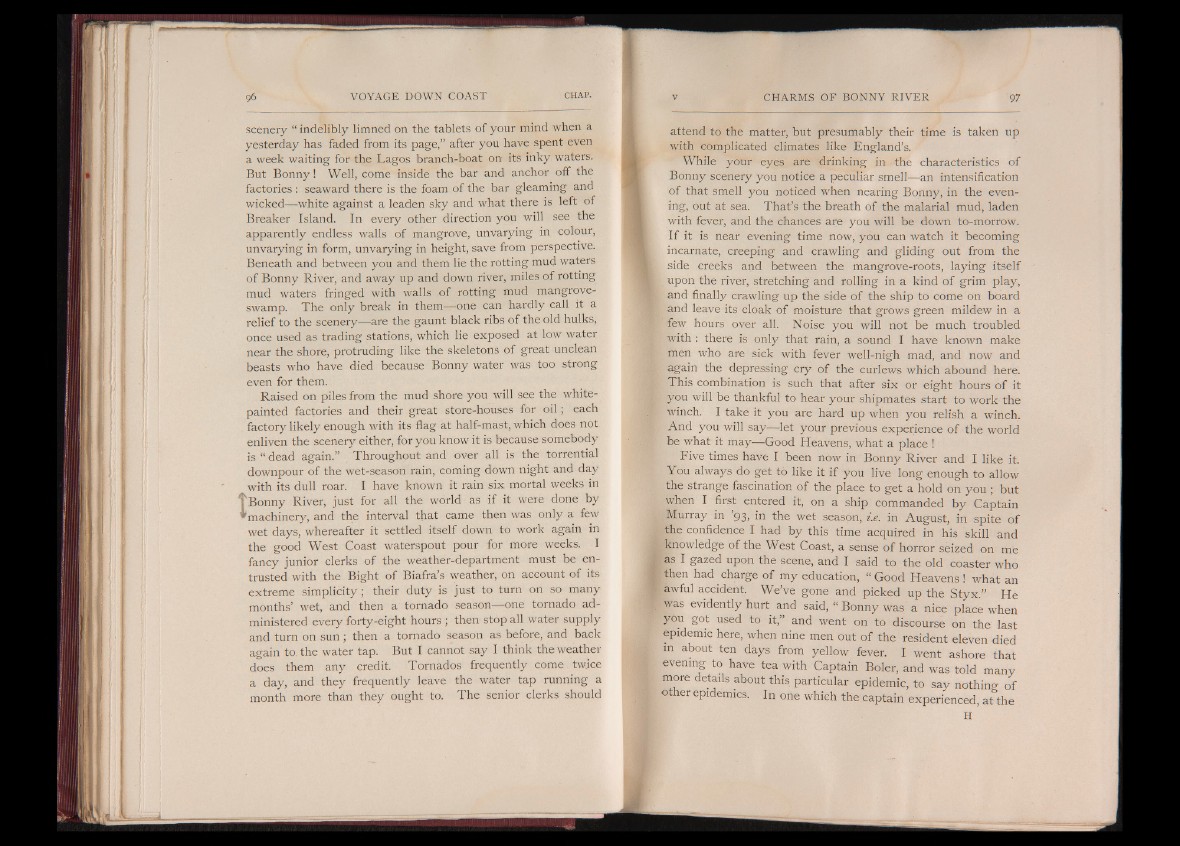
scenery “ indelibly limned on the tablets of your mind when a
yesterday has faded from its page,” after you have spent even
a week waiting for the Lagos branch-boat on its inky waters.
But Bonny! Well, come inside the bar and anchor off the
factories : seaward there is the foam of the bar gleaming and
wicked— white against a leaden sky and what there is left of
Breaker Island. In every other direction you will see the
apparently endless walls of mangrove, unvarying in colour,
unvarying in form, unvarying in height, save from perspective.
Beneath and between you and them lie the rotting mud waters
of Bonny River, and away up and down river, miles of rotting
mud waters fringed with walls of rotting mud mangrove-
swamp. The only break in them— one can hardly call it a
relief to the scenery— are the gaunt black ribs of the old huIks,
once used as trading stations, which lie exposed at low water
near the shore, protruding like the skeletons of great unclean
beasts who have died because Bonny water was too strong
even for them.
Raised on piles from the mud shore you will see the white-
painted factories and their great store-houses for o il; each
factory likely enough with its flag at half-mast, which does not
enliven the scenery either, for you know it is because somebody
is “ dead again.” Throughout and over all is the torrential
downpour of the wet-season rain, coming down night and day
with its dull roar. I have known it rain six mortal weeks in
Bonny River, just for all the world as if it were done by
»machinery, and the interval that came then was only a few
wet days, whereafter it settled itself down to work again in
the good West Coast waterspout pour for more weeks. I
fancy junior clerks of the weather-department must be entrusted
with the Bight of Biafra’s weather, on account of its
extreme simplicity; their duty is just to turn on so many
months’ wet, and then a tornado season— one tornado administered
every forty-eight hours ; then stop all water supply
and turn on sun ; then a tornado season as before, and back
again to the water tap. But I cannot say I think the weather
does them any credit. Tornados frequently come twice
a day, and they frequently leave the water tap running a
month more than they ought to. The senior clerks should
attend to the matter, but presumably their time is taken up
with complicated climates like England’s.
While your eyes are drinking in the characteristics of
Bonny scenery you notice a peculiar smell— an intensification
of that smell you noticed when nearing Bonny, in the evening,
out at sea. That’s the breath of the malarial mud, laden
with fever, and the chances are you will be down to-morrow.
I f it is near evening time now, you can watch it becoming
incarnate, creeping and crawling and gliding out from the
side creeks and between the mangrove-roots, laying itself
upon the river, stretching and rolling in a kind of grim play,
and finally crawling up the side of the ship to come on board
and leave its cloak of moisture that grows green mildew in a
few hours over all. Noise you will not be much troubled
with : there is only that rain, a sound I have known make
men who are sick with fever well-nigh mad, and now and
again the depressing cry of the curlews which abound here.
This combination is such that after six or eight hours of it
you will be thankful to hear your shipmates start to work the
winch. I take it you are hard up when you relish a winch.
And you will say— let your previous experience o f the world
be what it may— Good Heavens, what a place !
Five times have I been now in Bonny River and I like it.
You always do get to like it if you live long enough to allow
the strange fascination of the place to get a hold on you ; but
when I first entered it, on a ship commanded by Captain
Murray in ’93, in the wet season, i.e. in August, in spite of
the confidence I had by this time acquired in his skill and
Knowledge of the AYest Coast, a sense of horror seized on me
Hs I gazed upon the scene, and I said to the old coaster who
|then had charge of my education, “ Good Heavens ! what an
awful accident. We’ve gone and picked up the S ty x ” He
was evidently hurt and said, “ Bonny was a nice place when
you got used to it,” and went on to discourse on the last
epidemic here, when nine men out of the resident eleven died
in about ten days from yellow fever. I went ashore that
evening to have tea with Captain Boler, and was told many
more details about this particular epidemic, to say nothing of
other epidemics. In one which the captain experienced, at the
H